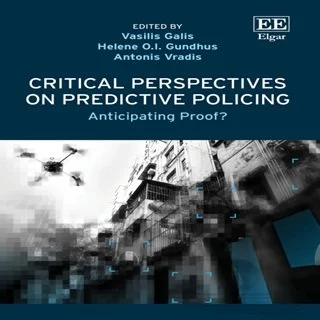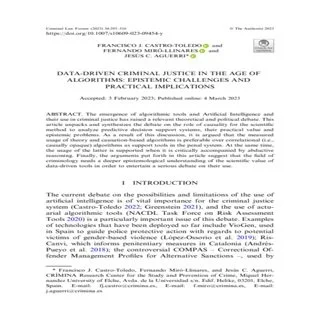By Guha Krishnamurthi
We are in the age of the Data State. Increasingly capable artificial intelligences, equipped with vast amounts of data, will integrate into every aspect of our lives. Penal systems are no exception-algorithms are already being deployed in criminal investigations, bail determinations, and sentencing decisions. Thinkers of all stripes-including scholars, activists, and science-fiction authors-have warned us of the dire consequences of such algorithmic criminal systems. Philip K. Dick's Minority Report presaged an apocalyptic society predicting and preemptively punishing criminal behavior. Minority Report featured precognitives-or "precogs"-individuals that had psychic ability to predict premeditated murders. Today, we are warned, algorithms are the new precogs, with an uncannily accurate but impenetrable method of determining the future. And we can expect that society will pervasively use such predictions to pre-punish individuals. Our societal desire to stop criminal wrongs will come at the heavy cost of our freedom. Understandably, this has led people to stridently oppose the use of algorithmic criminal systems. In this Article, I proffer a vision of how to integrate algorithms into criminal systems that aims to enhance, rather than curtail, our freedom and minimize the reach of the draconian criminal law. Consider a simple example: Jaywalking. Under the Minority Report view, police would use algorithms to predict jaywalkers and ticket them preemptively. But under an alternative system, algorithms would predict vehicle movement, and allow people to cross the street safely whenever they wish. Similarly, an algorithmic criminal system could probabilistically predict the occurrence of other crimes, including violent crimes, and first deploy alternative interventions to stop the crime while zealously avoiding penal responses.
From these examples, the Article derives the Liberty-Enhancing View, with a concrete set of principles for implementing an algorithmic criminal system: First, algorithmic systems should seek to avoid imposing punishment on individuals. Second, algorithms should seek to eliminate pretextual, intrusive conduct by the government. Third, algorithms should seek to eliminate malum prohibitum laws, through superior coordination. Fourth, algorithms should seek to eliminate inchoate liabilities. And fifth, algorithms should not seek to discover and punish bad character of individuals, especially through criminalizing inchoate conduct. This Liberty-Enhancing View does not seek to shelter the penal system from algorithms. Instead, it focuses our use of algorithms to advance the principles underlying our criminal justice system, with the aspiration of eliminating the harms of the penal state.
Houston Law Review, 2025, 56p.




